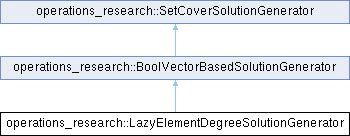 |
Google OR-Tools v9.15
a fast and portable software suite for combinatorial optimization
|
 |
Google OR-Tools v9.15
a fast and portable software suite for combinatorial optimization
|
Definition at line 347 of file set_cover_heuristics.h.
#include <set_cover_heuristics.h>

Additional Inherited Members | |
| Protected Member Functions inherited from operations_research::SetCoverSolutionGenerator | |
| SetCoverModel * | model () const |
| BaseInt | num_subsets () const |
| double | time_limit_in_seconds () const |
| Protected Attributes inherited from operations_research::SetCoverSolutionGenerator | |
| absl::Duration | run_time_ |
| SetCoverInvariant::ConsistencyLevel | consistency_level_ |
|
inlineexplicit |
Definition at line 350 of file set_cover_heuristics.h.
|
inline |
Definition at line 353 of file set_cover_heuristics.h.
|
inlinefinalvirtual |
Reimplemented from operations_research::BoolVectorBasedSolutionGenerator.
Definition at line 222 of file set_cover_heuristics.h.
|
inlinefinalvirtual |
Reimplemented from operations_research::BoolVectorBasedSolutionGenerator.
Definition at line 218 of file set_cover_heuristics.h.
|
finalvirtual |
Reimplemented from operations_research::BoolVectorBasedSolutionGenerator.
Definition at line 427 of file set_cover_heuristics.cc.